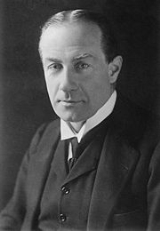
, PC
(3 August 1867 – 14 December 1947) was a British
Conservative
politician, who dominated the government in his country between the two world wars. Three times Prime Minister
, he is the only one to serve under three different monarchs (George V
, Edward VIII and George VI).
Baldwin first entered the House of Commons in 1908 as the Member of Parliament for Bewdley
, and held government office in the coalition ministry of David Lloyd George
.
A lot of hard-faced men who look as if they had done very well out of the war.![]()
If I did not believe that our work was done in the faith and hope that at some day, it may be a million years hence, the Kingdom of God|Kingdom of God will spread over the whole world, I would have no hope, I could do no work, and I would give my office over this morning to anyone who would take it.![]()
Tom Mosley is a cad and a wrong 'un and they will find it out.![]()
What the proprietorship of these papers is aiming at is power, and power without responsibility — the prerogative of the harlot through the ages.![]()
I think it well ... for the man in the street to realise that there is no power on earth that can protect him from being bombed. Whatever people may tell him, the bomber will always get through. The only defence is offence, which means that you will have to kill women and children more quickly than the enemy if you want to save yourselves.![]()

